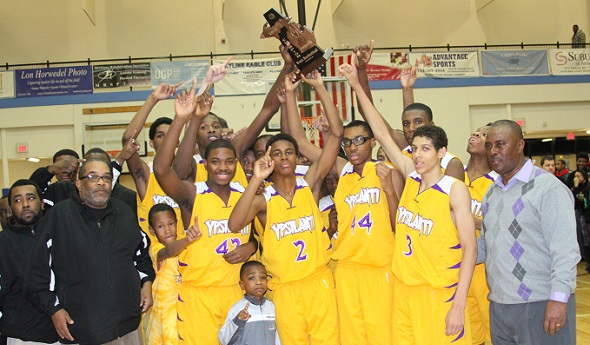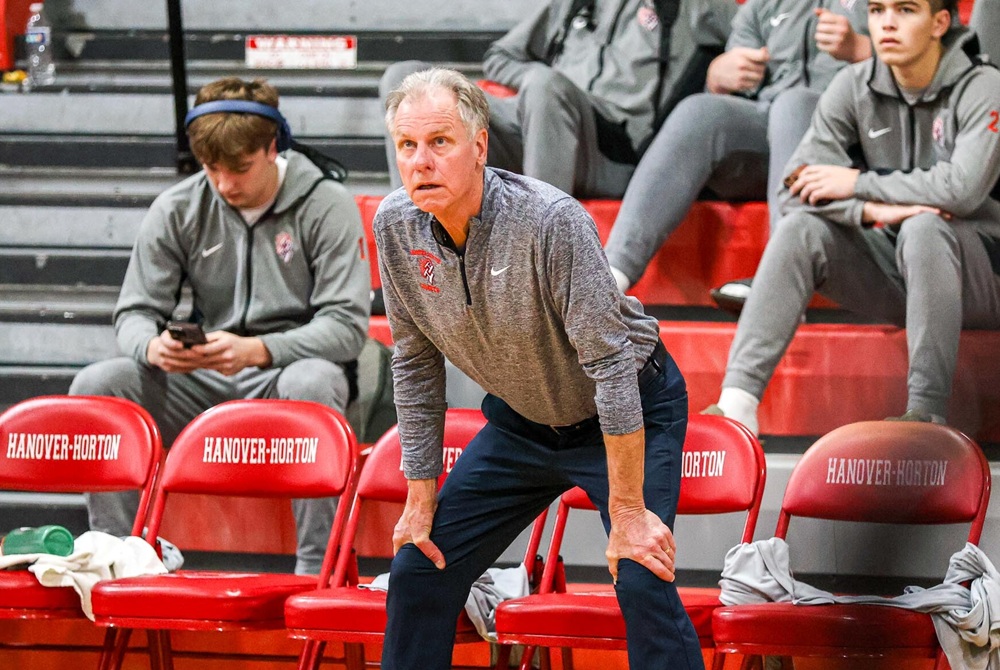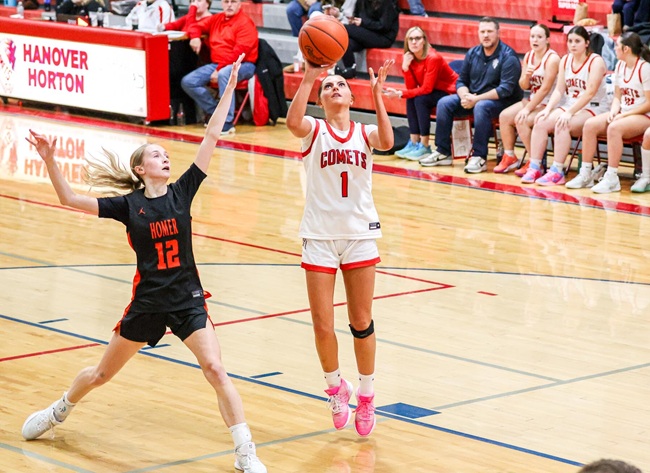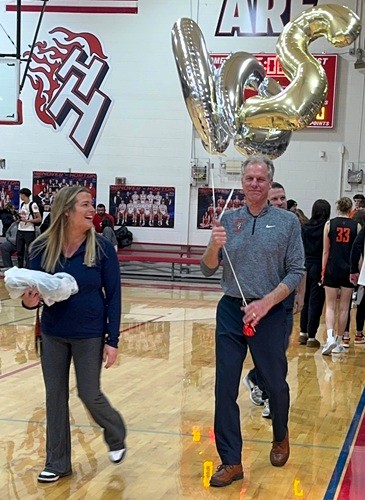
Lessons Passed Down the Coaching Tree
By
Geoff Kimmerly
MHSAA.com senior editor
July 18, 2013
Lessons, like legends, are meant to be passed from generation to generation.
And just as parents hand them down to their children who then do the same, coaches teach athletes the best of what they learned as athletes themselves. Some of those athletes then become coaches as well, and in turn, educate a next group of teenagers growing up in part through their participation in sports.
As we begin to turn our eyes toward another school year beginning next month, here are a few favorite lessons taught by four recent participants of the MHSAA’s Coaches Advancement Program – with back stories on how they learned those lessons themselves and explanations of why passing them on continues to be important.
We are family
Steve Brooks
Ypsilanti boys basketball
Bio: Brooks led the Ypsilanti High School program the last 10 seasons, guiding the Phoenix last winter to its first Regional championship since 1981. He has been selected as the first boys basketball coach for the newly-formed Ypsilanti Community Schools, a merger of the former Ypsilanti and Willow Run districts. Previously, he coached three seasons at Inkster and also led that program to the Quarterfinals.
Lesson learned: Brooks was in fourth grade when he and a friend happened to ride their bike past Flint Northern’s football practice field during one of coach Fred Crawford’s training sessions. The noise and excitement and especially the defensive coaches yelling first caught the kids’ attention; Brooks and his friend ended up watching through the fence until Crawford approached and asked if they’d like a closer look. “He said, ‘Hey, you’re going to be a Viking one day, aren’t ya?’ It was so simple. But it made an impression on me as a young man, the pride and tradition of going there,” Brooks said.
Brooks’ family later moved to a neighborhood in Flint Northwestern’s district. But when the school boundary was redrawn before his junior year – and he had his choice of staying or attending Northern – Brooks remembered saying he would be a Viking one day and made the switch. Building togetherness remains a major focus of Brooks’ Ypsilanti program today, 49 years after Crawford first invited him into Northern’s football family.
Lesson taught: “At any time, our players can come in and talk about personal things and feel like they can let stuff out and it won’t go further than the people it’s entrusted to,” Brooks said. Making a connection to players begins early through his middle school coaches and remains key to building that familial trust.
It’s a philosophy that goes to Brooks’ core. “When you’re starting to coach nephews and younger brothers of players you’ve had, it’s that same type of feeling and promoting of family,” Brooks said.
Do the right thing
Heather Prentice
Portage Northern competitive cheer
Bio: Prentice has coached Portage Northern the last eight seasons and guided the 2007 and 2008 teams to the MHSAA Finals. Total, she’s coached cheer since 1986, including previous tenures at Climax-Scotts and Laingsburg.
Lesson learned: Prentice learned more from what she felt her high school experience lacked. She loved cheering – but decided as a coach to take an active role in the lives of her athletes. “I’ve matured the older I’ve gotten, and I think what’s become more important the older I’ve gotten is putting more of the focus on what I want my kids to leave with,” Prentice said.
“I’m not a parent, and I’m a person in their lives for a very short time,” she added. “But it’s a very significant period in life, and I try to carry myself as I would want them to remember me.”
Lesson taught: To that end, Prentice focuses on mixing plenty of fun with the hard work and lessons she teaches. Integrity ranks high on that list.
She’ll point out during workouts that if an athlete does 23 jumping jacks instead of 25, only that girl will know. But cutting corners, if it continues, tends to catch up with a person.
The payoff is finding out those lessons have paid off.
“The great thing about coaching for so long is you get letters or emails back from kids; ‘I thought of you today when I was disciplining my 3-year-old child,’ things like that. Or, ‘I went in for a job interview and they asked for one of my qualities. And I said I have integrity. I do have integrity, and you taught me that.’ Those are the cool moments,” Prentice said. “They really did hear me; they did hear what I am saying.
Accept responsibility
Duane Enderle
Birch Run girls and boys soccer
Bio: Enderle has coached Birch Run’s girls program since its start, and this spring led the Panthers girls to the District Final for the second time during the program’s six-season history. He also coached the boys for four seasons before taking the last two off, but will return to their sideline this fall.
Lesson learned: Enderle was a sophomore starter on his South Hagerstown, Md., team during one of the first seasons under eventual longtime coach Mike Tesla. At one point that season, Enderle didn’t make a Saturday practice – and during the next Monday’s game never left the bench.
“I learned at an early age it doesn’t matter how good you are. There’s always a consequence,” Enderle said.
Lesson taught: He’s noticed the last few seasons, both on the high school and club soccer fields, a growing number of players unable to control their emotions. “They get yellow cards and come out of a game for 10 minutes, and if it’s one of the good players it ends up hurting the team,” Enderle said.
He said this year’s Birch Run team saw a different side of him as he pushed accountability a little bit harder. It’s a lesson that doesn’t lose significance, even as athletes change over the years and push boundaries in different ways.
“That’s the biggest thing I try to pass on to them, their own self-responsibility and accounting for all of their actions,” Enderle said. “Everything they do always has consequences.”
One for all
Kim Crum
Mattawan girls lacrosse
Bio: Crum is a 2002 Mattawan graduate and played three seasons for the highly-successful softball program led by coach Alicia Smith. Crum just finished her third season coaching the school’s girls lacrosse team after previously coaching the Kalamazoo United team for three seasons.
Lesson learned: Being part of a team is a full commitment to those teammates, something Crum works to instill in her players each spring. She learned that in part as an athlete under Smith – who last season led Mattawan to its second MHSAA championship in three seasons. “With a group of teenage girls, a group of any teenagers for that matter, they form cliques and opinions of people before they get (on a team),” Crum said. “When we were on that team, there were people that didn’t agree, didn’t get along. But when we set foot in practice, for a game, we were part of a team and it didn’t matter what happened outside of there during the day. I try to tell the kids that now.”
Lesson taught: Instead of finishing practices with “1-2-3-Wildcats,” the team’s mascot, Mattawan closes with “1-2-3-Family!” Crum’s emphasis on “team commitment” also has grown through working with her assistant Matt Stephens, the school’s football coach during the fall.
Playing a high school sport often means seeing those coaches and teammates as much or more than family during that three or fourth-month span. Some of Crum’s lacrosse players have played together in the past or together on other sports teams. But she and Stephens are quick to remind them that each team, each season, is a new group with new dynamics to learn.
“Every time we do something, we look at it as how it affects the group,” Crum said. “We have to figure out how each other work. ... Be patient. By the end, we’ll figure things out.”
PHOTO: Ypsilanti boys basketball coach Steve Brooks (far right) celebrates with his team this March after leading the Phoenix to its first Regional title since 1981. (Photo courtesy of Randy Castro, Ann Arbor Journal.)

200 Wins Later, Lusk's 'Yes' Still Paying Off as Hanover-Horton Surges
By
Doug Donnelly
Special for MHSAA.com
February 3, 2026
Joe Lusk has had to be talked into coaching a couple of times.
But that hasn’t stopped him from being a winner.
 The Hanover-Horton girls basketball coach picked up career victory No. 200 last week when the Comets improved to 12-1 with a victory over Homer. It’s the best start to the season for Hanover-Horton since girls basketball transitioned from a fall sport to winter two decades ago.
The Hanover-Horton girls basketball coach picked up career victory No. 200 last week when the Comets improved to 12-1 with a victory over Homer. It’s the best start to the season for Hanover-Horton since girls basketball transitioned from a fall sport to winter two decades ago.
“He holds his girls accountable and wants to get the best out of each and every one of them,” said Comets athletic director Chris VanEpps. “We are very lucky to have him here at Hanover-Horton.”
Lusk’s career spans two Cascades Conference schools – his alma mater Michigan Center, and Hanover-Horton for the past five seasons. He was also on the bench at Michigan Center when the Cardinals enjoyed incredible success under coach Scott Furman.
Lusk’s story isn’t the typical one about a high school athlete growing up wanting to be a coach. The Consumers Energy retiree, in fact, never considered coaching basketball until his daughter Courtney came home one day and told him he was coaching her team.
“She was in the fifth grade,” Joe Lusk said. “She told me there was a tournament at Vandercook Lake, she was playing and I was going to coach. I told her no way.”
That no slowly turned into a yes.
 After coaching the youth basketball team for several years, Lusk was asked by Furman to join his varsity staff.
After coaching the youth basketball team for several years, Lusk was asked by Furman to join his varsity staff.
“He probably asked me 20 times,” Lusk said. “I kept telling him no. Ten years later, I was still coaching.”
Courtney grew into a varsity player and Lusk became an assistant coach.
“The joke at our house was she was either going to be a good basketball player or she was going to be in therapy,” Lusk said. “She would come home after a tough game and say, ‘Is tonight a therapy night?’”
Not much therapy was needed. The Cardinals went through a remarkable run during which they reached the MHSAA Finals twice and Semifinals another season before Courtney graduated in 2006.
Joe Lusk remained an assistant but, in 2012, Furman died, shocking the Michigan Center community. The ultra-successful coach had won more than 350 games during his career. Lusk took over the job, although he had reservations about becoming head coach.
Over the next nine seasons those reservations were put to rest as the Cardinals won 149 games. In 2018, they went 23-3 and made a run to the Division 3 Semifinals.
Lusk’s last season at Michigan Center was 2020-21. In June 2021, he was hired at Hanover-Horton.
“They found out there was an opening at Hanover and my wife (Cindy) and Courtney put together my resume and sent it in,” Lusk said. “They told me they were doing it. They wouldn’t let me quit (coaching).”
He was hired.
 “Having an experienced coach like Coach Lusk is very important for our program,” VanEpps said. “His consistency and effort to make things better, not just for his teams, but for Hanover-Horton in general, give our younger staff someone to model themselves after. As for the girls on his team, he is stern but fair, which is something that can be lost on our younger generations.”
“Having an experienced coach like Coach Lusk is very important for our program,” VanEpps said. “His consistency and effort to make things better, not just for his teams, but for Hanover-Horton in general, give our younger staff someone to model themselves after. As for the girls on his team, he is stern but fair, which is something that can be lost on our younger generations.”
As for his current team being 12-1, Lusk knows the Comets have difficult games coming up. The Comets face Michigan Center (12-2) on Wednesday, Brooklyn Columbia Central (9-2) in a Cascades Conference West game in two weeks and state-ranked Concord in a nonconference matchup. Hanover-Horton also is in a District with powerhouses like Jackson Lumen Christi and Grass Lake. If the Comets win the Cascades West, they will likely face Grass Lake in the conference title game.
“We know the second half of our schedule is loaded,” he said.
Through it all, basketball remains a family sport. Courtney is the Comets’ junior varsity coach. Cindy keeps the scorebook for every game, something she has done for years.
“We are a basketball family,” Lusk said. “If Cindy didn’t do what she does, I wouldn’t be here today. She does a lot of work. For our juniors program, she keeps track of everything, all of the kids, what their shirt sizes are. If I had to do all of that, I wouldn’t be doing it. She loves basketball.”
 Doug Donnelly has served as a news and sports reporter at the Adrian Daily Telegram and the Monroe News for 30 years, including 10 years as city editor in Monroe. He's written a book on high school basketball in Monroe County and compiles record books for various schools in southeast Michigan. He is now publisher and editor of The Blissfield Advance, a weekly newspaper. E-mail him at [email protected] with story ideas for Jackson, Washtenaw, Hillsdale, Lenawee and Monroe counties.
Doug Donnelly has served as a news and sports reporter at the Adrian Daily Telegram and the Monroe News for 30 years, including 10 years as city editor in Monroe. He's written a book on high school basketball in Monroe County and compiles record books for various schools in southeast Michigan. He is now publisher and editor of The Blissfield Advance, a weekly newspaper. E-mail him at [email protected] with story ideas for Jackson, Washtenaw, Hillsdale, Lenawee and Monroe counties.
PHOTOS (Top) Hanover-Horton girls basketball coach Joe Lusk monitors the action during a game this season. (Middle) Lila Hamisfar (1) puts up a shot against Homer. (Below) Lusk carries balloons celebrating his 200th win alongside Hanover-Horton teacher and basketball parent Courtney Toteff. (Top and middle photos by Hannah Tacy/JTV. Below photo courtesy of Cindy Lusk.)

